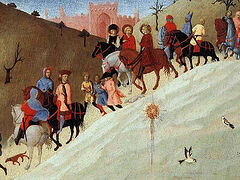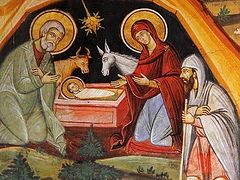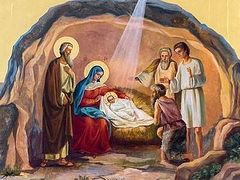 Photo: vitamarg.com The main feast for Christians is Pascha, Easter. It is the feast of warriors who have won the battle. Wounded but alive, tired but joyful, still gripping their weapons though their arms are weary, they look to the banner of victory. Here it is, slowly but surely being lifted on high, above troops who in their thousands proclaim the victorious “Hurrah!” This is Easter.
Photo: vitamarg.com The main feast for Christians is Pascha, Easter. It is the feast of warriors who have won the battle. Wounded but alive, tired but joyful, still gripping their weapons though their arms are weary, they look to the banner of victory. Here it is, slowly but surely being lifted on high, above troops who in their thousands proclaim the victorious “Hurrah!” This is Easter.
The second feast in importance is Christmas. This is a feast for children. They skip around the Christmas tree, hand in hand, and pick treats from its fragrant branches—gingerbread and sweets. Nobody tells them off, for today is a special festive occasion and everything is allowed—except, perhaps, for setting fire to the tree. There is a present for every child, the air is filled with the smell of oranges, and the window panes are decorated by frost in a way that not even the best artist in the world could replicate. This is Christmas.
In the course of a single liturgical year, the Church enables us fully to experience spiritual childhood and spiritual maturity, at least once. To begin with, we are little children, which is why the feast of Christian childhood—Christmas—comes first in the Church’s year. Then we grow up and immerse ourselves in the dramatic ambiguity of life, where we are only able to survive thanks to the victory of Pascha. These two closely linked feasts are tautly stretched between the two poles of Christian life like a vibrating musical string. Together they form an axis around which the whole universe revolves. This year, once again, we are breathing in the frosty, intoxicating air of Theophany.
No, I did not make a mistake. In ancient times, both Christmas and Theophany used to be celebrated on the same day, as one feast. And since the atmosphere of this feast reminds me of that of a happy childhood, I’ll take the liberty of explaining its meaning with another example from childhood. Many of us know how curious children can be, how hungry they are for everything new and unusual. Well, imagine that a boy rushes into his classroom or the playground, with hair all dishevelled and eyes shining with joy, and he shouts: “Hey! Guess what I’ve seen!” Tens of eyes light up in response: “What? Where?” It would take him too long to try to explain, so he simply says, “Come on, I’ll show you!” Immediately, swift little feet chase after “the discoverer”, clattering like a herd of wild horses as they all try to be the first to see what this unusual thing might be.
So, too, should we run towards that cave in Bethlehem, with curiosity and bated breath—even though we already know what happened. No one is allowed an excuse, everyone should go. If you love science, study nature, comprehend the meaning of the universe but do not pray to God and do not believe in His Christ, you will be condemned by the Magi, those Three Wise Men, and the stars will be twinkling over your head disapprovingly. If you are simple and uneducated, if you earn your bread by hard, monotonous work but grumble about your fate and believe that the Christian faith is the privilege of the well-fed and the idle, then the shepherds will stand before you with a silent look of reproach. Even if you are an ass (because of your stubbornness, for example) or an ox (let’s say because of the sluggishness of your mind), you too should bow down before the newborn infant lying in His crib and at least warm Him.
One of the cruellest misfortunes of our times is loneliness. Typical, traditional society is being destroyed. Family ties are weakening, the institution of marriage is being shaken, what is natural is becoming a rarity, and ugliness is identified as the norm. Someone who for years has been living amid a bustling crowd of people may not, in fact, always have another person to talk to. The heavens become leaden, and it seems that even up there nobody cares about you. Earth suddenly seems unfriendly, and you walk as if wiping your feet on it, with the frightening thought that one day you will have to return to it. “I haven’t killed anybody! I haven’t stolen anything!”—this is how modern man typically likes to characterise himself. But, in spite of this, he goes through life like Cain, groaning and trembling with fear.
And then suddenly such joy! An important guest has come to see me! “You are coming to me, Lord. You are searching for me, I who have lost my way” —with such words as these the Church repeatedly sings of the coming of the Lord into this world. Yes, God has come to visit us. It would be extremely disrespectful not to show Him hospitality, not to tidy the “inner chamber” (Mt 6.6) of our soul, not to prepare for Him something tasty, however simple. Not to open the door to Him would be utterly appalling.
In the East, hospitality is considered, not without reason, to be one of the greatest virtues. It is as if people felt that cordiality towards an unknown traveller might give rise to something greater. Indeed, some of them welcomed angels disguised as travellers, and for doing so received a blessing and were saved from perdition (cf. Gen 18). However, the greatest and most unexpected fruit of hospitality is the welcoming as a guest of Christ Himself. And here we have one more aspect of this feast—namely, that on this day we, along with the children who laugh and dance around the Christmas tree, are the cordial hosts who opened the door when we heard some knocking and who, unexpectedly, have let inside the Master of universe.
The more we live and think, the more we wonder how people manage to live without God? What keeps them going? What are they hoping for? What makes them happy? All in all, is this really a life when there is no God in it? Christ Himself was amazed at two things on this earth: faith, and the absence of it. He rejoiced when He saw the faith of the centurion from Capernaum, but was astonished at the unbelief of the scribes (cf. Mk 6.6). So let us surprise our Saviour during this joyous season with our faith. Let us each do what we can so that in this plastic-celluloid world of ours God might find something to take delight in.





